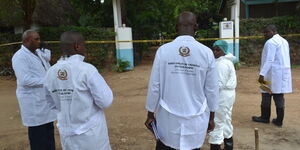A staggering 269,000 Kenyans have been revealed as victims of modern slavery between 2016 and 2023, according to a new survey by the Global Slavery Index.
Released on Friday, June 7, in Kilifi, the report paints a distressing picture of forced labour and marriage, ranking Kenya 88th globally in terms of the prevalence of modern slavery.
Former British Prime Minister Theresa May, speaking at Maisha Safe House in Kilifi, expressed grave concern over the rising tide of modern slavery. May attributed this alarming trend to increasing geopolitical and economic volatility, conflict, and climate change.
Modern slavery encompasses various forms of exploitation, including forced labour, servile marriage, debt bondage, and human trafficking. Victims of modern slavery are deprived of their fundamental freedoms and face coercion, threats, and violence, making it difficult for them to escape these dire situations.
"Progress towards eradicating modern slavery and human trafficking is falling alarmingly short of global ambitions," May remarked during her recent visit to Kilifi and other coastal areas.
The report points to Kenya's vulnerability to modern slavery, with a staggering 66 per cent of the population at risk, placing the country behind nations like Nigeria, Ethiopia, and Cameroon.
May stressed that modern slavery and human trafficking are global issues affecting all countries, highlighting the need for a concerted effort to understand and address the root causes of these problems.
According to the Global Estimates of Modern Slavery report, a shocking 10 million people worldwide were forced into labour or marriage in 2016, pushing the estimated number of modern slavery victims to 50 million.
In response to these alarming statistics, the Global Commission on Modern Slavery convened in Kenya to examine the impact of modern slavery and human trafficking on Kenyans and the wider region.
Joseph Motari, Principal Secretary for Social Protection and Senior Citizen Affairs, reaffirmed the government's commitment to eradicating modern slavery and human trafficking. Motari disclosed that the Ministry of Labour has introduced regulations to ensure ethical recruitment practices for Kenyans seeking employment abroad, particularly in the Middle East, while also enhancing reporting mechanisms for slavery cases.
Sophie Otiende, CEO of the Global Fund to End Modern Slavery and founder of Azadi Community, shared her determination as a survivor of modern slavery to combat this issue in Kenya. Otiende stressed the importance of including those impacted by modern slavery in the efforts to address and eradicate it.
The commission also engaged with representatives from 17 African nations and 27 civil society organisations to devise strategies to combat forced labour in supply chains.
Florence Keya from Maisha Safe House highlighted the pervasive nature of modern slavery and human trafficking, particularly concerning girls. Keya noted that many girls subjected to modern slavery are employed as domestic workers or are exploited within their own families, citing instances of the juvenile sex trade in Malindi.












